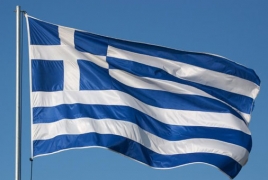Greece’s economy expected to contract in 2015: official August 11, 2015 - 09:57 AMT PanARMENIAN.Net - Greece’s economy is expected to contract by up to 2.3% this year, according to a draft of the country’s bailout agreement, a Greek government official said Monday, Aug 10, according to the Wall Street Journal. The official, who is directly involved in ongoing negotiations between Athens and its lenders for a bailout worth up to €86 billion (about $95 billion), said the agreement estimates that Greek gross domestic product will contract by 2.1% to 2.3% this year, “unless there is a last-minute change.” The accord foresees that Greece won’t target a primary budget surplus—which strips out interest payments—for 2015, the official added. The country’s original bailout deal called for a primary surplus of 3% of GDP for this year. Negotiations to secure a third bailout deal in time to prevent Greece from defaulting on €3.2 billion in bonds owned by the European Central Bank by Aug 20 appeared to be advancing over the weekend. Greek Finance Minister Euclid Tsakalotos and Economy Minister George Stathakis resumed talks Monday with representatives from the four institutions overseeing the rescue program, the European Commission, the International Monetary Fund, the ECB and the eurozone’s own bailout fund. In Berlin, however, German Chancellor Angela Merkel’s government cautioned that it wouldn’t rush into a deal. “Of course, a speedy conclusion of the negotiations is desirable, but we must not forget that this is about a three-year program, a program with a comprehensive list of reforms and additional measures, a program that should then be a long-term reliable basis for cooperation,” Merkel’s spokesman, Steffen Seibert, said at a news conference. “Thoroughness comes before rapidness.” German Finance Ministry spokesman Jürg Weissgerber said that Berlin was ready to examine any deal “this week, if necessary,” but that details mattered. Greece must agree to an “ambitious budget and fiscal planning, a credible funding strategy and a sustainable pension reform.” Greece’s funding needs and debt sustainability depend on these measures, he said, according to the Journal. Germany is Greece’s largest creditor. Its parliament, as well as those in several other countries, must approve any new package. Over the weekend, the parliamentary floor leader of Merkel’s conservative bloc in parliament, Volker Kauder, caused an uproar among his lawmakers after he said those members of parliament who voted against authorizing the start of bailout talks in July should be excluded from parliamentary committees dealing with the Greek issue. Merkel and others have insisted that the IMF needs to be on board of a third bailout package. The IMF insists Greece needs a comprehensive debt restructuring by the eurozone while Germany opposes writing off debt and has signaled Berlin would consider debt-maturity extension instead. A parliamentary group official said that without the participation of the IMF, the number of conservative lawmakers against a third bailout would probably exceed the 60 out of 310 who voted on July 17 against authorizing new bailout talks. Halle-based German think tank IWH said that contrary to widespread belief, Germany has benefited substantially from the European debt crisis, which helped the country to balance its budget since 2012. That is because Germany’s borrowing rates fell, yielding interest savings of more than €100 billion during the period 2010 to 2015, according to the institute. “When discussing the costs to the German taxpayer of saving Greece, these benefits should not be overlooked, as they tend to be larger than the expenses, even in a scenario where Greece does not repay any of its debts,” IWH said. “We are ready for a speedy examination [of a deal] this week, if necessary. However, quality comes before speed,” a German finance ministry spokesman said. Yerevan has dismissed Turkey’s demand to shut down the Armenian nuclear power plant as “inappropriate”. Armenia will loan 2.9 billion drams to Nagorno Karabakh (Artsakh), according to a draft government decision. The Ministry of Ecology and Natural Resources of Azerbaijan has “strongly condemned” Armenia’s decision. Kerobyan has said that for the first time in the history of Armenia, the volume of foreign direct investments amounted to about $1 billion. Partner news |